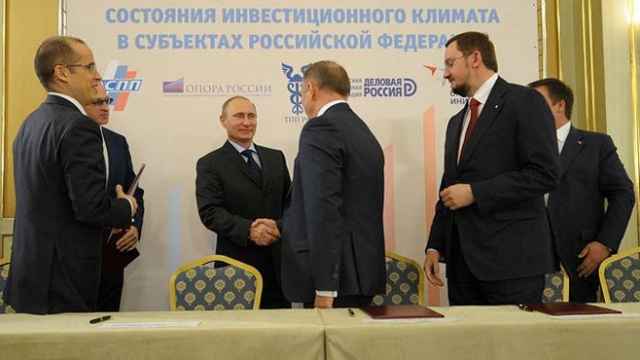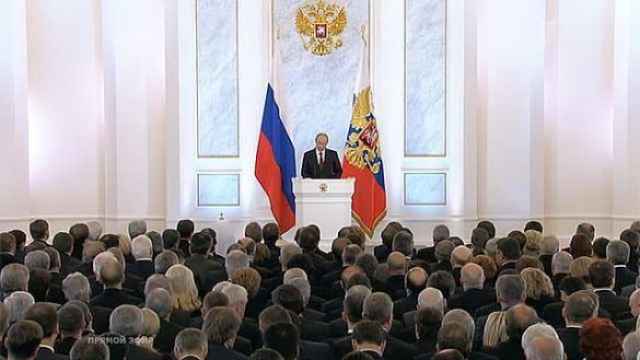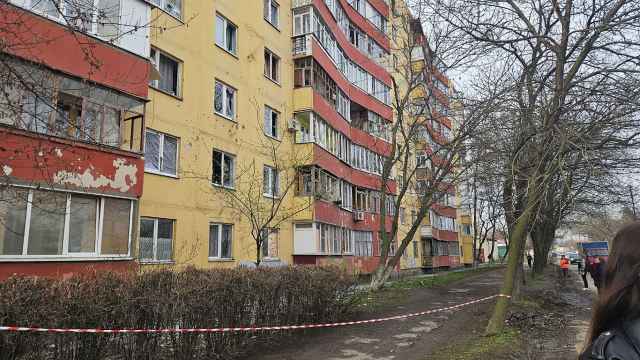Russia's government has approved a new tax law to clamp down on Russian companies and individuals using offshore tax shelters.
The law is part of a range of measures initiated by President Vladimir Putin and collectively known as "deoffshorization" that are aimed at bringing Russian businesses and money home from foreign jurisdictions.
Pressure on Russians to move assets and corporate structures to Russia from abroad has intensified this year because of the crisis in Ukraine, which has highlighted the vulnerability of Russian assets abroad to Western sanctions.
The new law would introduce modifications to the tax code that will force Russian owners of companies based abroad to pay taxes in Russia.
"The law considers establishing a mechanism for taxation in the Russian Federation of incomes of controlled foreign companies, if these companies do not distribute their incomes for the benefit of Russian entities, controlling such companies," the government said in a statement on its website on Saturday.
The government's approval means the law will now be submitted for consideration by parliament, where it could yet be amended but is unlikely to face strong opposition.
The deoffshorization policy was initiated in 2012 by Putin, who has been annoyed by the decision of many Russian businesses to create offshore ownership structures, typically in tax havens such as Cyprus, which are reducing tax revenues in Russia.
Putin has also backed measures to make officials and parliamentarians divest offshore property and bank accounts.
Under the new law foreign companies and other organizations with Russian owners would be classed as "controlled foreign companies."
Any Russian company or individual that owns 25 percent or more of a foreign organization would be categorized as a "controlling entity.” This threshold would drop to 10 percent if the total shareholding of Russian tax residents amounted to 50 percent of the foreign company.
Russian-owned companies operating in jurisdictions where they are paying an effective profit tax of 75 percent or more, however, would be exempt from the new law.
The government said it would be appropriate to consider raising the ownership thresholds and lowering the effective tax rate threshold to preserve Russian companies' competitiveness. It nevertheless backed the law, originally prepared by the Finance Ministry, in its current form.
"We consider that these measures, considered by the law, as a whole will facilitate cutting the use of low tax jurisdictions for receiving unjustified tax advantages, and will also allow taxation of undistributed profits of controlled foreign companies," the government said in its statement.
"The government of the Russian Federation supports the law."
A Message from The Moscow Times:
Dear readers,
We are facing unprecedented challenges. Russia's Prosecutor General's Office has designated The Moscow Times as an "undesirable" organization, criminalizing our work and putting our staff at risk of prosecution. This follows our earlier unjust labeling as a "foreign agent."
These actions are direct attempts to silence independent journalism in Russia. The authorities claim our work "discredits the decisions of the Russian leadership." We see things differently: we strive to provide accurate, unbiased reporting on Russia.
We, the journalists of The Moscow Times, refuse to be silenced. But to continue our work, we need your help.
Your support, no matter how small, makes a world of difference. If you can, please support us monthly starting from just $2. It's quick to set up, and every contribution makes a significant impact.
By supporting The Moscow Times, you're defending open, independent journalism in the face of repression. Thank you for standing with us.
Remind me later.






